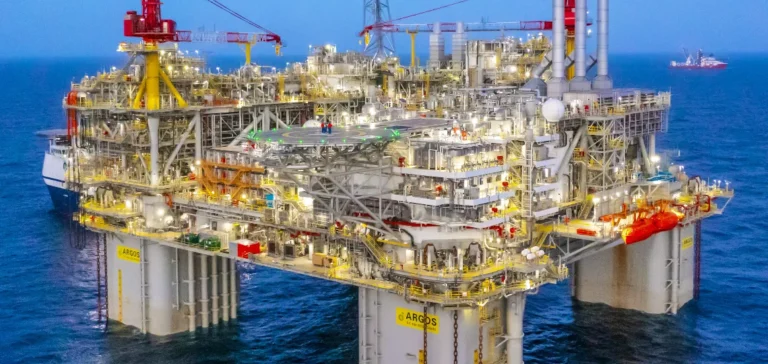The company bp has announced the commissioning of the Argos Southwest extension, its fifth major project launched in 2025 in the Gulf of America. This development includes a new subsea tieback of three wells to the Argos platform, operational since 2023, allowing an additional 20,000 barrels of oil per day to be added to the existing capacity, which now reaches 140,000 barrels per day.
Infrastructure optimisation and maintenance schedule
The Argos Southwest Extension project includes the installation of a new drilling centre, located nearly eight kilometres southwest of the main platform. This extension of the Mad Dog field was completed seven months ahead of schedule, that is, in only 25 months after the discovery, thanks to optimised maintenance management and the simultaneous organisation of several workstreams. These measures ensured the reliability of equipment and the availability of infrastructure, while securing supplies from the earliest stages of the project.
The deployed strategy is based on enhanced management of maintenance operations and the anticipation of necessary interventions on existing facilities. bp’s teams coordinated the planning of works in order to minimise production interruptions as much as possible, thus ensuring a progressive ramp-up in extracted volumes.
Impact on operational performance and sustainability
The Argos Southwest extension marks an important step in the evolution of bp’s offshore maintenance programmes, with ten major projects scheduled for commissioning worldwide by 2027. Two other extensions are planned in the Gulf of America before the end of the decade, including the Atlantis Drill Center 1 expansion, which is expected to bring 15,000 barrels of oil equivalent per day, as well as a major expansion of the Atlantis centre to increase the reliability of the production system.
In parallel, the Kaskida platform will complement the American offshore infrastructure with a production capacity of 80,000 barrels per day from 2029. This project is part of a logic of renewal and modernisation of assets, allowing for better long-term control of maintenance operations.
Collaboration between operators and asset management
bp holds a 60.5% operational stake in the Argos Southwest extension, while Woodside Energy and Union Oil Company of California hold 23.9% and 15.6% respectively. All partners are working together to optimise offshore asset management, ensuring the technical integrity of equipment and the continuity of operations in the Gulf of America.
The maintenance strategy adopted on the Argos Southwest Extension reflects bp’s commitment to maintaining its infrastructure and anticipating servicing needs, while maximising the return on investments made in the area. The rapid development and operational readiness of the site illustrate bp’s ability to deploy innovative maintenance solutions in offshore oil production.






















